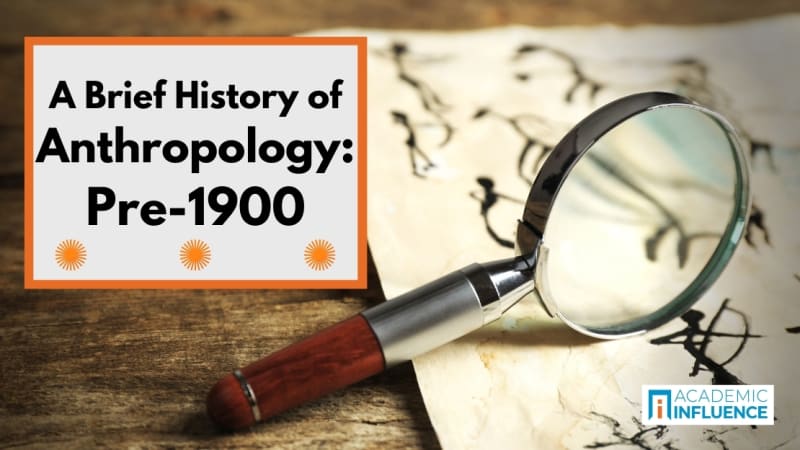A Brief History of Anthropology: Pre-1900

We explore the field of anthropology from ancient Greece through the end of the 19th century.
Like many academic disciplines today, the field of anthropology traces its roots back to ancient Greece. The Greek historian Herodotus in the 4th century B.C. wrote what we might now call “early anthropology” by documenting and attempting to understand the disparate cultures of Greece and Persia. Greece during Herodotus’ time had defeated the Persian Empire to the East, opening up Persia for study and examination by Greek scholars. His treatise, titled simply Histories, described the Persian peoples and their culture, and argued in what would become a centuries-long tradition that the Western culture of Greece was superior to the Eastern culture of Persia, a view no doubt buttressed by the military conquest of Persia in the early part of his life. Yet Herodotus also bequeathed to later generations of scholars the practice of examining and exploring other cultures as a route to understanding. That is why many historians of anthropology trace the field’s roots back to him.
Interested in exploring the field of anthropology as an undergraduate? Find out How to Major in Anthropology.
The European middle ages took up the question of foreign or different cultures but largely through the lens of the Christian religious views dominating European scholarship at the time. It took the Enlightenment of the 17th and 18th centuries and thinkers such as Jean-Jacques Rousseau and John Locke to view the study of other cultures as properly in the domain of rational study and examination, apart from the filter of preconceived religious ideas. Thus Rousseau could take up the question of “noble savages,” and famously argue that modern civilization (particularly in the West) had in a sense corrupted and transmuted the original, native impulses of humanity. Rousseau’s theme was later used to great effect by Karl Marx and Frederick Engels in writing their treatise on the evolution of civilization from capitalism (profit-seeking) to communism (shared community).
Interested in earning an advanced degree in anthropology? Find out what you can do with a Master’s Degree in Anthropology?
The “scientific” view of anthropology thus emerged. By the 19th century Darwin’s theory of evolution encouraged a view of society and culture as evolving through stages. Early anthropologists thus looked for evidence of “fitness” in different cultures and sought to explain cultural survival and dominance in terms of a competition of ideas. Those ideas which contributed to cultural growth and military strength were generally deemed superior. It was this perspective that contributed substantially to European colonialism, in which the spread of European empires by Spain, Portugal, France, Belgium, Denmark and Britain led to confrontation (frequently violent in nature) with disparate and often vastly different peoples and cultures in non-European lands. Understanding culture–what it was, how it functioned in society, and how it helped explain and predict political (and military) outcomes–thus took on larger significance in the West. Modern anthropology owes its origin to this period of spreading colonialism. Notably, this period also saw the emergence of empirical methods in science and, consequently, the development of new tools and techniques for disciplines as diverse as linguistics and archaeology. By the late 1800s, American anthropologist Lewis H. Morgan , writing in the anthropology journal Ancient Society, would proclaim European civilization as the pinnacle of an evolutionary or scientifically identifiable process of cultural progress.
During the same period, British anthropologist Edward Burnett Tylor also promulgated a broadly evolutionist view of culture with European civilization at its apex. In particular, Tylor attempted to explain a key component of culture–religious belief–as a process of evolution beginning with animism and continuing into polytheism, and thereafter, monotheism, as practiced by Christians, Jews, and Muslims. Tylor’s views not only echoed the general Darwinian influence in anthropology but also that of other still-incipient fields, like sociology. Early sociologist Auguste Comte –who in fact is often credited with coining the term “sociology”–also argued that religious belief passes through stages, and that religion itself is gradually replaced by science and technology as cultures advance. These views no doubt set the stage for major upheaval and change in the field of anthropology in the 20th century.
Find out which influencers have most contributed to advancing the field of anthropology over the last two decades with a look at The Most influential People in Anthropology, for the years 2000–2020.
And to find out which schools are driving the anthropology field forward today, check out The Most Influential Schools in Anthropology, for the years 2000–2020.
Or, read on to find out about the next stage in the history of the anthropology discipline.
Visit our Study Guide Headquarters for tips, tools, and much more.
See our Resources Guide for much more on studying, starting your job search, and more.